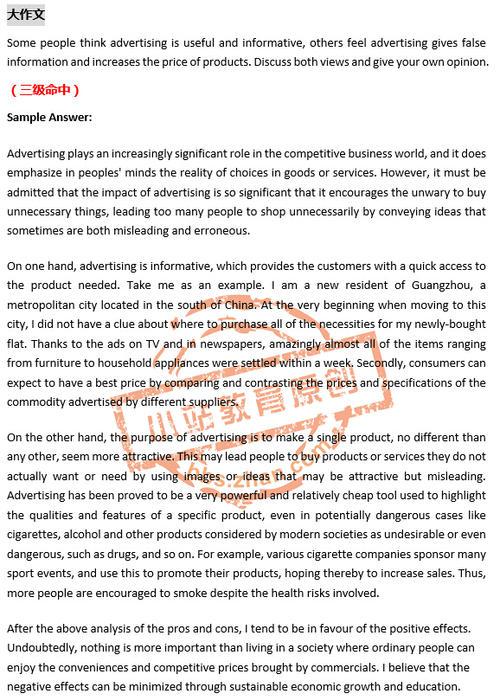雅思写作大作文范文分析-社会类
2020-09-27 21:08:24 149

In many countries today people are in a ‘throwaway society’, where things are used in a short time and then thrown away. What are its causes? What are its problems?(20191214-大陆区大作文)
翻译:在当今的许多国家,人们生活在一个所谓的“抛弃式社会”中,在这种社会里,人们习惯购买的物品仅短暂使用后就将其抛弃, 其原因是什么?会造成什么问题?
解析: 这是一道社会类的考题,题型是报告类,题目要我们分析一个社会现象产生的原因及影响。那么我们首先先来一起看一下这是一个什么样的社会问题。我们来看一看维基百科中对于throwaway society的解释:“The throw-away society is a human society strongly influenced by consumerism. The term describes a critical view of overconsumption and excessive production of short-lived or disposable items over durable goods that can be repaired.” ( wikipedia)
简单理解 :throwaway society就是指:随着经济发展-生产力和购买力增加- 社会中出现过度购买过度生产不耐用产品及一次性产品的现象- 如过度使用一次性餐具,餐盒,一次性纸杯,塑料袋等。
那么造成这个社会现象的原因有哪些呢?
很多小伙伴会觉得思考原因很困难,在这里小编教给大家一个方法。凡是涉及到社会现象,社会发展过程中产生的问题的题目,大家可以通过对比过去和现在的差别来找到原因。比如,在这个题目中,在过去,物品生产出来后一般都会被长期使用,坏了也会去修;而现如今,物品生产出来后,使用周期短,也很少有人愿意去修补了。这个差异由什么因素造成的呢,现在和过去有什么差别呢?其实现在和过去的差别往往都是经济,科技,生活方式等固定的这几点。首先:经济发展了,人们手里的闲钱多了,有钱买新产品;其次:科技发展了,产品更新换代的速度快了,比如手机和电脑,也许修旧的还不如买新的;再来就是生活方式变了,生活节奏变快了,人们对外卖,快递等等的需求量增加,促使一次性产品的大量消耗;还有比如媒体的推动作用,过去人们很少有机会看到广告,对新产品的信息不及时,现在电视,网页等随处都是广告,激发了人们的购物欲望,加快了产品的更替。
这种社会现象会产生的问题,大家在日常生活中可能都有体验。比如你可能会发现,自己家里每天都有好几袋子垃圾要扔,长辈总是在一遍感叹他们小时候哪有这么多垃圾啊...过度的抛弃势必会产生过多的垃圾,垃圾处理产生环境污染,气候变暖。很多国家现在都已经开始执行限塑令了,普通塑料袋已经不再提供,人们需要自备袋子或者购买可回收利用的环保袋子。很多环保♻️游说团体也在举办各种活动和游行,提高人们对于环保和浪费问题的重视程度。
范文分析:
The proliferation(扩散=spread throughout) of single use products(对题目词汇的改写) is a major concern for all countries. In my opinion, the main cause of this is increased disposable income coupled with (=combined with) advances in technology and the main result of this trend is environmental degradation(=the environment getting worse- 环境恶化- 推荐背诵,环境污染等题目都可以使用).
(首句:社会热点问题改写+二句:作者的观点:词语概括原因及影响- 简洁明了,精准的给出原因及影响,体现对于词汇的掌控能力- 这个开头句写的很好,大家可以套用:the proliferation of …. is a major concern for …. In my opinion, the main cause of this is 原因1 coupled with 原因2 and the main result of this trend is 影响)
The rise of single or limited use products comes from new technologies and people’s ability to afford these items. (topic sentence) A hundred years ago, it would not have been possible to cheaply produce plastic products on a mass scale(大规模). The technological advances of the last hundred years have made these products profitable for large companies like Walmart. Of course the advances in technology have only met demand from a burgeoning(迅速发展的,快速增长的,替换growing, increasing) global middle class. People today do not have to use the same plates, dishes, and bags that previous generations would have been more protective of; nowadays people can afford to buy and throw out various household items.
(第一句为主题句,第二句为过去的情况,第三句在对比科技发展后现在的情况,进行了今昔对比,第四句再说这个情况产生的后果,绿色部分为作者举的例子)
The main result of the overdependence(rely too much on
过度依赖) on single use products is burning more fossil fuels(化石能源,此处写的非常具体) which in turn escalates (好词-升级,加快+ speeds up-建议背诵)climate change.Cheap plastic is made through a chemical process involving raw oil and is then transported on ships or planes running on petrol before being carted on trucks to supermarkets. The total accumulation(积累,积攒) of fossil fuel consumption is therefore massive. In the last half century this has precipitated climate change leading to increases in the severity of natural disasters, further endangerment(=causing more risk/danger) of plant and animal species and dire(可怕的) warnings(可怕的警告,即signs of trouble in the future) by climate scientists for the standard of of future generations.
(此段结构依然是一个topic sentence+ 后面非常具体的解释-注意这一段的两袋内就在于具体-请记住在展开时要be specific and detailed)
In conclusion, the so-called ‘throwaway society’ is a result of economic and technological factors and is taking a massive toll (巨大的代价= large native impact -地道表达,建议背诵) on the environment. More governments should seek to curb(抑制,制止,减慢) this problem (此处为地道词组:curb the problem - slow down the problem - 建议背诵)by instituting wide-reaching bans on single-use plastics like straws and bags.
(注意第一句大家可以套用句型:In conclusion, the …. is a result of …. and ….. and is taking a massive toll on …..)
好词:
disposable: 形容词- 1) 可自由支配的- 如:disposable income/ resources 可自由支配的经济收入/资源 2)一次性的- 如:disposable chopsticks 一次性筷子。
household: 1)形容词:家庭的- 如:household goods 家庭用品 2)名词- 一家人,家庭- low-income households 低收入家庭。









